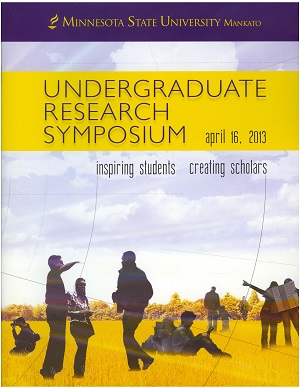Breaking the Silence: Perceptions of HIV/AIDS Among African Americans in the United States
Location
CSU Ballroom
Start Date
16-4-2013 2:00 PM
End Date
16-4-2013 4:00 PM
Student's Major
Government
Student's College
Social and Behavioral Sciences
Mentor's Name
Jacqueline Vieceli
Mentor's Department
Government
Mentor's College
Social and Behavioral Sciences
Description
Over the recent years, there has been an alarming increase in the population of individuals infected with the HIV virus in the U.S; however, it is infecting African Americans at a disproportionate rate as compared to other ethnic groups. Statistically, blacks make up about 14% of the US population but account for over 50% of all new cases of HIV, a rate that is 8 times greater than that of whites. This research is geared to uncover the reasons behind the alarming rates of infection by assessing the social, economical and behavioral determinants of health among African Americans living in the US. It also seeks to understand if underlying factors such as gender and sexuality have a significant role to play in one’s level of awareness. The research was conducted by reviewing the literature of two documentaries. These two sources were used to assess knowledge of HIV/AIDS among African Americans as it pertains to the individual and their community. The results of the research were very disconcerting and indicated that many African Americans were oblivious to the consequences that HIV/AIDS had within the Black community. Lack of education, stigma, a “down-low” lifestyle, high rates of incarceration, violence and the disempowerment of women were some to the themes that came up repeatedly. Being aware of one’s status, knowing the risk factors and having an open discourse about the impact of the disease were key steps that need to be taken in order to break the silence of this epidemic.
Breaking the Silence: Perceptions of HIV/AIDS Among African Americans in the United States
CSU Ballroom
Over the recent years, there has been an alarming increase in the population of individuals infected with the HIV virus in the U.S; however, it is infecting African Americans at a disproportionate rate as compared to other ethnic groups. Statistically, blacks make up about 14% of the US population but account for over 50% of all new cases of HIV, a rate that is 8 times greater than that of whites. This research is geared to uncover the reasons behind the alarming rates of infection by assessing the social, economical and behavioral determinants of health among African Americans living in the US. It also seeks to understand if underlying factors such as gender and sexuality have a significant role to play in one’s level of awareness. The research was conducted by reviewing the literature of two documentaries. These two sources were used to assess knowledge of HIV/AIDS among African Americans as it pertains to the individual and their community. The results of the research were very disconcerting and indicated that many African Americans were oblivious to the consequences that HIV/AIDS had within the Black community. Lack of education, stigma, a “down-low” lifestyle, high rates of incarceration, violence and the disempowerment of women were some to the themes that came up repeatedly. Being aware of one’s status, knowing the risk factors and having an open discourse about the impact of the disease were key steps that need to be taken in order to break the silence of this epidemic.
Recommended Citation
Vincent, Thomas. "Breaking the Silence: Perceptions of HIV/AIDS Among African Americans in the United States." Undergraduate Research Symposium, Mankato, MN, April 16, 2013.
https://cornerstone.lib.mnsu.edu/urs/2013/poster-session-B/43




